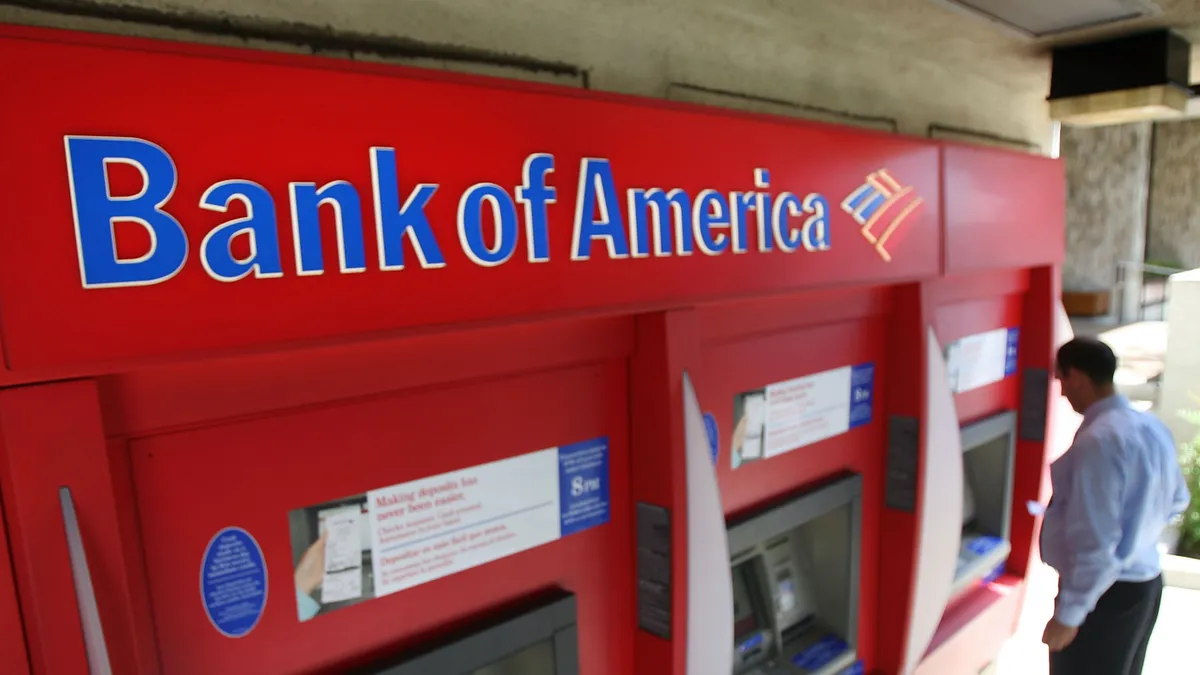Dive Brief:
- The Office of the Comptroller of the Currency (OCC) and the Consumer Financial Protection Bureau (CFPB) fined Bank of America $225 million over the bank’s handling of unemployment insurance and benefits payments during the COVID-19 pandemic, the regulators announced Thursday.
- “Bank of America automatically and unlawfully froze people’s accounts with a faulty fraud detection program, and then gave them little recourse when there was, in fact, no fraud,” the CFPB, which handed the bank a $100 million portion of the fine, said in a statement.
- Throughout the pandemic, Bank of America had contracts with 12 state agencies to deliver unemployment and other benefit payments to consumers electronically through prepaid debit cards and accounts, the OCC said.
Dive Insight:
“Today’s action demonstrates the OCC’s commitment to holding our regulated institutions accountable for treating consumers fairly,” Acting Comptroller Michael Hsu said in a statement. “The bank failed these prepaid cardholders by denying them access to their mandated unemployment funds during the height of the pandemic, and leaving these vulnerable consumers without an effective way to remedy the situation. Banks must pay attention to the financial health of their customers and conduct their activities in accordance with all consumer protection laws. When they don’t, we will act accordingly.”
The OCC said it also found deficiencies in Bank of America’s administration of the prepaid card program, including in operational processes, risk management and internal controls.
“Beginning in 2020, these deficiencies resulted in violations of law and harm to consumers,” the regulator said.
The OCC ordered the bank to provide remediation to harmed consumers whose access to unemployment benefits was denied or delayed, and to improve its risk management and oversight over the program.
The CFPB accused the bank of implementing a faulty fraud filter that would trigger an account freeze over a “simple set of flags.”
“This set a low bar to freeze the unemployment insurance benefits of many people, harming thousands of legitimate cardholders needing the money,” the CFPB said.
The bank’s limited agent availability made it difficult for customers to unfreeze their accounts, the CFPB added.
“People were on hold for hours every day for weeks trying to talk to someone at the bank,” the agency said.
Instead of providing assistance, Bank of America often redirected customers to California’s “overwhelmed state agency,” the CFPB said.
“But the bank knew the department was stretched and unable to provide services; the bank met with the department dozens of times in the summer of 2020 and should have known it was essentially redirecting people into a black hole,” the CFPB said.
In a statement to Banking Dive, the Charlotte, North Carolina-based lender said it partnered with state clients to identify and fight fraud throughout the pandemic, and issued more than $250 billion in pandemic unemployment benefits to more than 14 million people.
“This action arose despite the government’s own acknowledgment that the unemployment program expansion during the pandemic created unprecedented criminal activity where illegal applicants were able to get states to approve tens of billions of dollars in payments,” the bank said.
The bank said it worked with California to identify “hundreds of thousands of suspicious cards and assisted the state in protecting billions of dollars.”
In 2020, Bank of America told state legislators more than $2 billion had been stolen from California’s unemployment fund.
The bank flagged 640,000 accounts in the state’s unemployment benefits system with suspicious activity that should be investigated, bank officials said in a letter.
Bank of America serves California as part of the Unemployment Benefits Prepaid Card Program, a contract that has been extended through June 30, 2023, the bank said.













